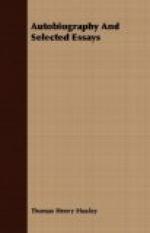Then with respect to aesthetic knowledge and discipline, we have happily in the English language one of the most magnificent storehouses of artistic beauty and of models of literary excellence which exists in the world at the present time. I have said before, and I repeat it here, that if a man cannot get literary culture of the highest kind out of his Bible, and Chaucer, and Shakespeare, and Milton, and Hobbes,[81] and Bishop Berkeley,[82] to mention only a few of our illustrious writers—I say, if he cannot get it out of those writers he cannot get it out of anything; and I would assuredly devote a very large portion of the time of every English child to the careful study of the models of English writing of such varied and wonderful kind as we possess, and, what is still more important and still more neglected, the habit of using that language with precision, with force, and with art. I fancy we are almost the only nation in the world who seem to think that composition comes by nature. The French attend to their own language, the Germans study theirs; but Englishmen do not seem to think it is worth their while. Nor would I fail to include, in the course of study I am sketching, translations of all the best works of antiquity, or of the modern world. It is a very desirable thing to read Homer in Greek; but if you don’t happen to know Greek, the next best thing we can do is to read as good a translation of it as we have recently been furnished with in prose.[83] You won’t get all you would get from the original, but you may get a great deal; and to refuse to know this great deal because you cannot get all, seems to be as sensible as for a hungry man to refuse bread because he cannot get partridge. Finally, I would add instruction in either music or painting, or, if the child should be so unhappy, as sometimes happens, as to have no faculty for either of those, and no possibility of doing anything in any artistic sense with them, then I would see what could be done with literature alone; but I would provide, in the fullest sense, for the development of the aesthetic side of the mind. In my judgment, those are all the essentials of education for an English child. With that outfit, such as it might be made in the time given to education which is within the reach of nine-tenths of the population—with that outfit, an Englishman, within the limits of English life, is fitted to go anywhere, to occupy the highest positions, to fill the highest offices of the State, and to become distinguished in practical pursuits, in science, or in art. For, if he have the opportunity to learn all those things, and have his mind disciplined in the various directions the teaching of those topics would have necessitated, then, assuredly, he will be able to pick up, on his road through life, all the rest of the intellectual baggage he wants.




